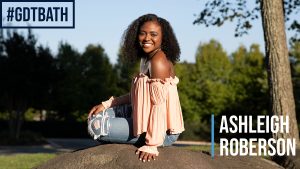Ashleigh Roberson’s first year at UNC-Chapel Hill hasn’t been the college experience she planned on when she applied to the University. But through Carolina Away, Roberson has built connections and got her footing in her classes.

Like most students who started their Tar Heel careers in the fall, Ashleigh Roberson’s first year at UNC-Chapel Hill hasn’t been the college experience she planned on when she applied to Carolina.
There haven’t been opportunities for the transfer student from the University of Tennessee to meet other students in person, and navigating academics through remote learning took some time to figure out.
“I felt lost at first,” Roberson said. “Usually, if we were in person, I might be able to meet people through class or just walking or going to the dining hall — just basic human interactions like that. But we didn’t really have those, so we just had to rely on Zoom.”
Roberson began to build those connections and get her footing in her classes through Carolina Away, a program launched in fall 2020 because of the pandemic. The program combines virtual courses and social opportunities for first-year and transfer students who opted to attend Carolina remotely. More than 570 students are enrolled in the program.
Roberson attend high school in Chapel Hill and lives here with her family now. Even though she is close to campus, she joined Carolina Away because she is immunocompromised and felt safer learning from home during the pandemic. The program, she said, has been a crucial safety net for her health and has allowed her to stay on track academically.
She transferred from Tennessee after deciding she wanted to pursue a career in clinical lab sciences.
“I thought maybe something was leading me back home,” the sophomore said.
The program, however, has opened up new academic opportunities for Roberson.
All Carolina Away students are encouraged to take a course from its “Opportunity Curriculum,” which consists of nearly a dozen one-credit courses. Though the courses are open to all students, they are designed specifically for remote learning and Carolina Away. Roberson chose to enroll in the COVID Investigations course, where she met with faculty members and researchers to examine how various fields have adapted to the pandemic.
“It gave a broad spectrum of different careers and a way for us to connect with those people,” she said. “It was like the reverse of a history class. It was interesting to be talking about something that’s in the present that’s continually changing by the day, by the week.”
The class was almost like a weekly hour-long career day and gave Roberson a glimpse at career opportunities and the chance to get advice from “people who made it.”
“We had a lot of different people that we interviewed — different doctors or researchers or professors — and they were all saying ‘Don’t do anything that’s not going to make you happy in life because at that point it’s not worth it. Why would you want to spend the rest of your days here doing something that doesn’t make you happy?’” she said.
Roberson had planned on pursuing a Bachelor of Science in biology and become a researcher in a lab, but the conversations with experts led her to re-evaluate her career path. She knew that she was happiest when she was working with people, so she changed directions, picking up medical anthropology and shifting her biology focus to the Bachelor of Arts track.
Outside of her courses, Carolina Away provided Roberson an opportunity to stay engaged with other students. She became a member of the Carolina Away Student Advisory Committee, which provides students with an outlet to share their remote learning experiences with University leaders.
The committee’s inputs led to multiple changes for all Carolina students, including a feature in Connect Carolina that provides more details on the way courses are taught.
“When I went into those meetings, it was like ‘Tell me what’s up. What’s been working? What hasn’t been working?’” she said. “It was a space where you could be honest and not have to sugarcoat anything. We all knew coming into that that we would have to be upfront so that change could be made.”
Though she hasn’t stepped inside an academic building at UNC-Chapel Hill yet, Roberson feels that Carolina Away and the advisory committee provided her the opportunity to be part of the campus community and already leave a mark on the University.
“I felt like I had a voice. I figured I was in a unique position, and I should voice my opinion on the matter. I feel like it did make a huge difference.”
Learn more about Carolina Away. Watch a video.
By Brandon Bieltz, University Communications
